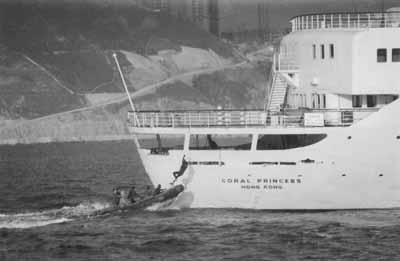
Not only did the officers and men of the SBU know each other about as
well as it is possible to know anyone, but their equipment and expertise
in its use was also constantly improving throughout the 1980s. Having
started in 1979 with 40 men
and six Zodiac inflatables, it had grown to a
Chief Inspector's command of over 100 by its tenth anniversary in 1989.
Its fleet by then numbered 13 high-powered vessels and its activities had
expanded from the prevention of illegal immigration to include crime and
anti-terrorist operations and the interception of speedboat operators and
smugglers in general. Its fame had spread internationally as well, and
people from countries such as Brunei, Oman
and even Britain had been
seconded to the unit to learn its methods.

The spirit of the unit was as legendary as its expertise, as anyone who has ever attended an SBU celebration (of anything!) will attest. This was hardly surprising for the men of the unit, volunteers all, went through a lot together. Chief Inspector Les Bird, who commanded in 1989, spoke of this to the police newspaper Off Beat:
"They usually stay in the unit for about three years and are then deployed to other divisions for a change and promotion chances."
In fact it was usually a case of `once an SBU man, always an SBU man': many officers returned to the unit time after time. One such was Ngai Fung-yee, who joined as a constable in 1979, was promoted to sergeant a year later, left for a while and then returned to be promoted to station sergeant in 1984. After a further period outside he returned again in 1989, and was still in the unit when he was promoted to inspector two years later.
Another was Station Sergeant But Yim-chiu, whom we last encountered fending off fish-bombs from his Zodiac inflatable back in 1979. He was the quintessential marine policeman: an excellent seaman who was perfectly at home at the helm of a boat but who also possessed the policeman's `nose' for a good case and the evidence to support it in court. Intelligent and quick-witted, he was not one to `suffer fools gladly' - even when they were his senior officers - and all through his service he battled for the rights and conditions of his fellow Mariners. He always led from the front and was doing just this one night in September 1991 when the daai-fei he was chasing turned and mercilessly crushed his rigid inflatable under its armoured bow. The men with him were injured but survived; he did not. His memory does though, and long may it do so.
The `SBU tag' did not just apply to the rank and file; inspectors who had made their mark in the unit were likely to find themselves back in it with each advance in rank as well. Les Bird had first served in the unit as an inspector, as had Superintendent John Cox, the first commander of the `Small Boat Division' when it was formed on May 1st 1995. There was - and at the time of writing still is - something about the SBU...